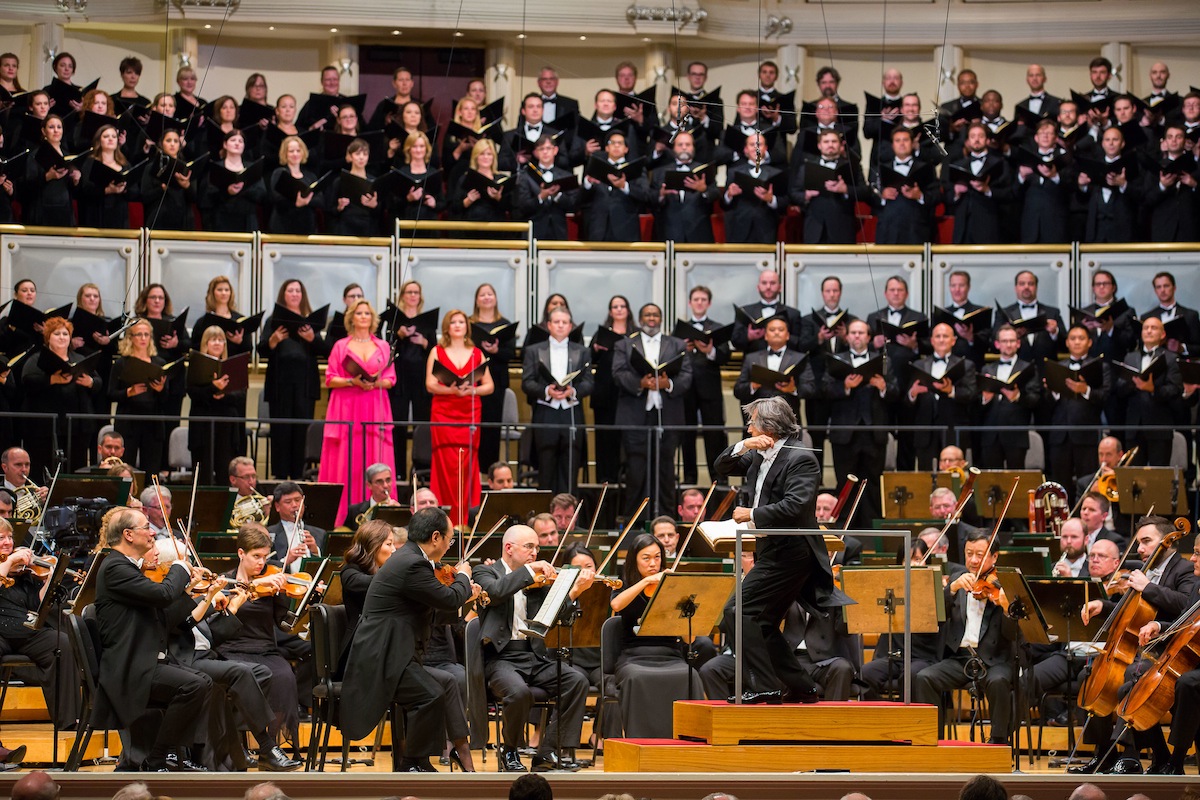Muti, CSO open new season with a mixed Beethoven Ninth

In the 190 years since Beethoven conducted the premiere of his Symphony No. 9– the deaf composer famously beating time after the music had ended—the world has experienced Gustav Mahler, Igor Stravinsky and Ozzy Osbourne. Is it possible in 2014 for this music to still seem strange, brilliant and revolutionary?
Performances of Beethoven’s Ninth are more commonplace then they were a century ago but still often reserved for special occasions. As was the case Thursday night when Riccardo Muti opened his fifth season as music director of the Chicago Symphony Orchestra with Beethoven’s mighty Ninth.
In addition to the sold-out house, traditional leadoff with the Star-Spangled Banner, and assorted new-season hoopla, unobtrusive on-stage camera crews captured the performance for future streaming by the CSO.
The Ninth is only the third Beethoven symphony Muti has conducted with the CSO. (The Fifth was heard here in 2012 and the Fourth in 2013.)
This rendering of Beethoven’s epic musical embrace of mankind displayed the elements of Muti’s Chicago performances generally and his Beethoven specifically: taut, laser-like grip, firm rhythmic focus, contrapuntal clarity and strikingly transparent textures. And, of course, the remarkably polished and inspirational playing of the CSO musicians.
The performance was most successful in the outer movements. The celebrated opening, with its two-note motive heard as if from afar, drew one into the ensuing D-minor drama., Setting a brisk pace, Muti charted the ebb and flow of the development with forceful playing and strongly punched out accents.
The problem Thursday was that the central movements didn’t offer sufficient relief from the roiling drama that framed it. The driving Scherzo felt more aggressive than buoyant, rhythms heavy-footed and over-emphatic. The silvery warmth of the contrasting string theme provided some respite.
More problematic was the literal quality of the long-breathed Adagio. The music was played with glowing tone and alert responsiveness to dynamics, phrasing and tempo fluctuations. Yet the mystery and searching, metaphysical quality of this elevated music was largely lacking, the depths under-explored. The playing felt calculated, the expression cool and on the surface.
The massive finale, with its solo quartet and large chorus, provided the most successful moments of the evening. After the orchestra rejects themes reprised from the first three movements, the gentle stealing in of the first appearance of the “Ode to Joy” theme in cellos and basses was magical in its delicacy. Rarely will one hear the blending of the sublime and the pedestrian–as in the central ditzy march-like variation—so convincingly presented and played with such power, precision and swagger.
The vocal quartet was largely consistent and successful. Eric Owens’ beefy bass-baritone negotiated his clarion “O Freunde, nicht diese Töne!” call with dexterity and sonorous impact. Subbing for an indisposed Christopher Ventris, Matthew Polenzani was wonderfully agile and vibrant in the impossible tenor tessitura. (William Burden will sing the remaining performances.) With ease of production, Camilla Nylund bestowed her bright and creamy voice on the stratospheric soprano line. Ekaterina Gubanova’s lightish mezzo was somewhat lost in all this big-voiced company; having the quartet placed at the back of the stage in front of the chorus didn’t help.
The CSO Chorus delivered one of their finest outings of recent seasons. Under Duain Wolfe’s direction, the ensemble sang with consistent power and well-blended voices across all sections with enviable clarity and crisp enunciation.
On to Tchaikovsky at Millennium Park tonight.
Beethoven’s Symphony No., 9 will be repeated 3 p.m. Sunday, 7:30 p.m Tuesday and at Saturday’s Gala Ball concert.
Riccardo Muti and the CSO will also present a free all-Tchaikovsky program 6:30 p.m. Friday at the Pritzker Pavilion. The program includes a suite from Sleeping Beauty, The Tempest and the Symphony No. 4. cso.org; 312-294-3000.
Posted in Performances





Posted Sep 22, 2014 at 9:22 am by Anne-Marie
The performance of Beethoven’s 9th on Saturday night’s Symphony Ball gala was magnificent and left my heart close to exploding. All sections outdid themselves for a soul-searing experience. They must have heeded your comments from Thursday’s concert.
Posted Sep 22, 2014 at 7:08 pm by Steve Heronemus
“Ditzy” march? Beethoven exhorting people to join arms and march against the class system is “ditzy”?
I too wish I had heard more of the mezzo soprano, but Saturday’s performance was exhilarating. Maestro Muti honored the score while making some bold tempo choices.
Posted Sep 23, 2014 at 5:52 am by Mark B
On Sunday’s performance, the first movement was the least successful. It plodded along despite excellent playing from the CSO. The scherzo was pretty good, but a bit straight. The third movement was sublime, and the fourth movement made its effect despite the so-so contribution of the vocal quartet.
Posted Sep 24, 2014 at 3:04 pm by Will
Beethoven’s 9th on Saturday night was AMAZING and a wonderful tribute to a composition that will last FOREVER…I loved it!
Big time cheers to the CSO and all.